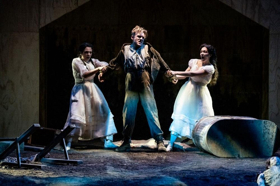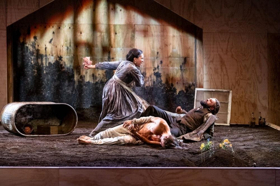Review: PROVING Mazzoli's Place in the New Opera Scene at the Miller in New York

Nims and Cree Carrico. Photo: Rob Davidson
Missy Mazzoli had me with BREAKING THE WAVES, her opera written with librettist Royce Vavrek (based on the Lars von Trier film) at Opera Philadelphia and PROTOTYPE 2017. With PROVING UP--same librettist and with a production also conceived by James Darrah, commissioned by the Washington National Opera, Opera Omaha and the Miller Theatre at Columbia University, where it had its New York debut last week--she proved she's a force to be reckoned with.
Whether she's bringing dissonance to contrast with her melodic take on an 1862 song or conjuring bitter ghosts with otherworldly sounds, she is a marvel and the International Contemporary Ensemble under conductor Christopher Rountree showed the score off brilliantly.
While the piece lasts under 90 minutes and it has no chorus (except for those ghosts), this is hardly what you'd call a small-scale work, even though the creators call it a chamber opera. It has big themes and leaves a big impression, even if it's one of hopelessness and misery, without a smile (let alone laugh) to be found. Compared to PROVING UP, even WOZZECK or LULU seem uplifting.

Shapiro (fr.). Photo: Rob Davidson
*As if anyone in the US with a cellphone, television or newspaper needs any further proof, PROVING UP doesn't just show us the dark side of the American Dream but the black one, with no hope and little love, the characters hanging on by their nails. The score is as scorching as the earth found by the homesteaders whose tale it tells.
The extraordinary production parallels the story of the Zegner family in the desperate days of the Homestead Act of 1862--based on the story of the same name by story by Karen Russell--with the hopelessness many feel in the current US political environment.
The Act provided that, basically, one had to become a slave to a 20-acre patch of land for five years and be able to show a well, a house of prescribed size with a door, a fence and, most importantly here, a glass window when an inspector came to call. Only then could the land be theirs--giving proof of their resources, both internal and external.
The story begins as the Zegners are reaching the breaking point in their homesteading journey: Two daughters have died (though they appear as specters throughout the piece, sung eerily by soprano Cree Carrico and mezzo Abigail Nims, without a trace of compassion for those left behind) and the eldest son, Peter (Sam Shapiro, in a nonsinging role), has had an accident that left him bloodied and broken.
Pa (baritone John Moore, who was Jan in BREAKING THE WAVES), is a semi-functioning alcoholic, while Ma (soprano Talise Trevigne) tries to hold things together. The younger son, Miles (tenor Michael Slattery), has to pick up the slack and take on more responsibility than he's ready for.
And then there's that window, which may be inanimate but plays a central role in the piece: With glass in short supply in Nebraska, the Zegners' window was worth its weight in gold for homesteaders. They have theirs from a family that has moved on--or, at least that's the story Pa tells in a manner that lets us know that something's not quite right in the state of Denmark...or, at least, Nebraska. Is his story true, or did he take matters into his own hands to get it?
Nevertheless, Pa is only too happy to share the wealth with neighbors who haven't been so fortunate, so they will have that required glass when the inspector comes to call...just as long as they return it the moment they've proved up. With Peter incapacitated, Miles is given the window to cart off to a neighbor about to get a visit from the inspector. From there, things go downhill rapidly.
Miles meets an unknown man, the Sodbuster (bass Andrew Harris), at the neighbors'; the man wants the window and is willing to wreak havoc to get it, even though the boy knows better than to put up a fight and offers the bribe that was meant for the inspector. Is the man a doppleganger for his father? It's left unclear, but that was my impression. (I haven't read original Russell's story to look for clues.)
The cast was first-rate. Tenor Slattery easily carried the central role of Miles, the Zegners' younger son, combining the purity of youth with the rawness of one who already knows the bitter ways of the world; his solo is one of the work's highlights.
Soprano Trevigne let her soaring, rich voice take advantage of some of Mazzoli's most elegant music as she attempts to hold the family together, while baritone Moore excelled as both a singer and actor, turning alcoholic and back, sour and sweet. Bass Harris's earthy, rich bass made the Sodbuster as fearsome as Mazzoli and Vavrek meant him to be.
Stage director Nathan Troup (Darrah's been involved in Opera Philadelphia's NE QUITTEZ PAS) kept the Zegners' grim reality only a breath away from us in Adam Rigg's sterling stage design of plywood and dirt, paired with Pablo Santiago's lighting and costumes by Chrisi Karvonides-Dushenko. (This production of Opera Omaha was originally designed for a different kind of stage.) We're brought headlong into the world of the Zegners and others of their ilk and feel like we need to clean it off us with a wire brush by the time the story is through.
As the opera speeded relentlessly through to its horrific conclusion, one could have used a spark of light, a glimmer that told us that, yes, maybe things might work out for this family--even if we know how unlikely that is.
It was recently announced that Mazzoli has been commissioned by the Metropolitan Opera for a pair of works, making her, along with Jeanine Tesori, the first women to receive this honor...and challenge. It will be interesting to see how Met audiences react to her unique musical language and outlook.
Reader Reviews

Videos

